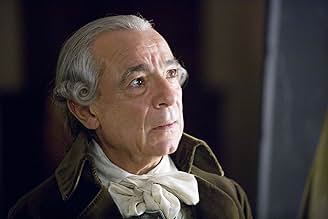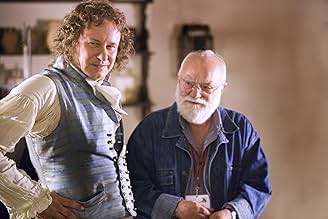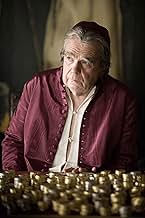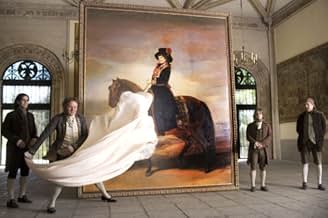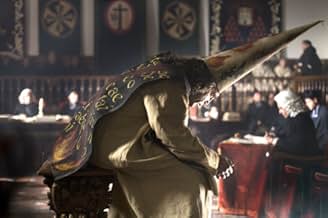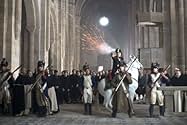IMDb-BEWERTUNG
6,9/10
32.646
IHRE BEWERTUNG
Der Maler Francisco Goya sieht sich mit dem Skandal um seine Muse konfrontiert, die von einem Mönch der Ketzerei beschuldigt wird.Der Maler Francisco Goya sieht sich mit dem Skandal um seine Muse konfrontiert, die von einem Mönch der Ketzerei beschuldigt wird.Der Maler Francisco Goya sieht sich mit dem Skandal um seine Muse konfrontiert, die von einem Mönch der Ketzerei beschuldigt wird.
- Regie
- Drehbuch
- Hauptbesetzung
- Auszeichnungen
- 2 Gewinne & 5 Nominierungen insgesamt
Empfohlene Bewertungen
The film is set in 1792 ,it deals with eclectic people during a convulsed era from Spain history . It starts with the Inquisition and some years later with the encroachment by Napoleon Army and finishes with the French defeat and restoration of the Spanish monarchy with Fernando VII , after the victory by general Wellington (Cayetano M. Irujo) . The painter (1746, born Fuentedetodos and deceased 1828,Burdeos) Francisco de Goya (Stellan Skarsgard) , quintessential Spanish artist , becomes involved with the Spanish Inquisition , when his muse named Ines (director cast Natalie Portman after noticing her likeness to the girl in Goya's painting "Milkmaid of Bordeaux") who painted her like an Angel in the church of Saint Antonio of Florida and he's now portraying , she then is framed as a heretic . His daddy named Thomas Bilbatua (Jose Luis Gomez) ask him help , hoping what his relationship with the monk Lorenzo (Javier Bardem) can achieve the freedom for his daughter . Meanwhile , Goya is dedicated the painting of the portrait the royal family : Carlos IV (Forman cast Randy Quaid as the King of Spain after seeing his work in ¨Elvis¨ by phoning him and saying, "You are a great actor , you must be my King or I must repaint Goya") , Mª Luisa (Blanca Portillo) and children .
The film is a touching drama added with historic elements and formidable performances . The movie creates a canvas upon a turbulent epoch concerning specially with Inquisition . It was created by Pope Sixto IV in 1478 , its creation is supposedly caused for threat by Jewish and Moors becoming Christianism but practically disappeared with the Borbons Kings (Felipe V,Fernando VI and Carlos III) and was definitively abolished by the Court of Cadiz though spontaneously restored by Fernando VII in 1814 . The sentences were executed by means of a public event called ¨auto of faith¨(thus happens on the final) . Near the end, when the king appears in the balcony at the execution scene, some people yell "Vivan Las Cadenas!" (Long live the chains!). This salute was coined in 1814 by Spanish monarchists when Fernando VII was restored to the throne with absolute powers, thus abolishing the Constitution of Cadiz, which was established by Napoleonic authorities.
The flick displays an interesting showing the means are manufactured the famous Goya's engravings : ¨The war disasters¨ , ¨bullfighting¨ and ¨Caprichos¨ . Besides , recreating historical happenings such as ¨Charge of Mamelucos¨ and ¨Execution on mountain of Principe Pio¨. The movie contains a top-notch star-studded cast , as Skarsgard , Portman , Bardem give a sensational interpretations . Scenarios are luxurious and impressive , being designed by the prestigious Patrizia Von Brandenstein , the sets including palaces , rooms , interiors and outdoors are mesmerizing . Lush and brilliant costume design by Ivonne Blake (Oscar for Doctor Zhivago and Nicholas and Alexandra). Colorful cinematography by expert Spanish cameraman , Javier Aguirresarobe , (The others) . The film was lavishly produced by the brothers Saul and Paul Saentz , Forman's usual producers .The motion picture was well directed by the classic Milos Forman , an expert about biographies of notorious characters such as ¨Amadeus¨ , ¨Larry Flynt¨ , ¨Andy Kauffman¨ (Man on the moon) ; besides filming a lot of successes like are ¨Ragtime¨ ,¨Hair¨, ¨Valmont¨ , and of course , his greatest hit ¨Someone flow the Cucko nest¨.
The film is a touching drama added with historic elements and formidable performances . The movie creates a canvas upon a turbulent epoch concerning specially with Inquisition . It was created by Pope Sixto IV in 1478 , its creation is supposedly caused for threat by Jewish and Moors becoming Christianism but practically disappeared with the Borbons Kings (Felipe V,Fernando VI and Carlos III) and was definitively abolished by the Court of Cadiz though spontaneously restored by Fernando VII in 1814 . The sentences were executed by means of a public event called ¨auto of faith¨(thus happens on the final) . Near the end, when the king appears in the balcony at the execution scene, some people yell "Vivan Las Cadenas!" (Long live the chains!). This salute was coined in 1814 by Spanish monarchists when Fernando VII was restored to the throne with absolute powers, thus abolishing the Constitution of Cadiz, which was established by Napoleonic authorities.
The flick displays an interesting showing the means are manufactured the famous Goya's engravings : ¨The war disasters¨ , ¨bullfighting¨ and ¨Caprichos¨ . Besides , recreating historical happenings such as ¨Charge of Mamelucos¨ and ¨Execution on mountain of Principe Pio¨. The movie contains a top-notch star-studded cast , as Skarsgard , Portman , Bardem give a sensational interpretations . Scenarios are luxurious and impressive , being designed by the prestigious Patrizia Von Brandenstein , the sets including palaces , rooms , interiors and outdoors are mesmerizing . Lush and brilliant costume design by Ivonne Blake (Oscar for Doctor Zhivago and Nicholas and Alexandra). Colorful cinematography by expert Spanish cameraman , Javier Aguirresarobe , (The others) . The film was lavishly produced by the brothers Saul and Paul Saentz , Forman's usual producers .The motion picture was well directed by the classic Milos Forman , an expert about biographies of notorious characters such as ¨Amadeus¨ , ¨Larry Flynt¨ , ¨Andy Kauffman¨ (Man on the moon) ; besides filming a lot of successes like are ¨Ragtime¨ ,¨Hair¨, ¨Valmont¨ , and of course , his greatest hit ¨Someone flow the Cucko nest¨.
The acting and production values are of the highest order in "Goya's Ghost". Because I don't get around much anymore, I had not seen Ms Portman in a movie until "Ghost", and was very impressed, for like all the roles in this movie, her's was challenging. Javier Bardem is tough to equal in any movie, and as the 'heavy', (another heavy?!) he is outstanding; Stellan Skarsgård has come a long, long ways since "The Ox", and he has had a mixture of roles, some of them pretty thankless. As Goya, he does very well--a great actor. Natalie Portman--as I was a first timer regards seeing her work, I was bowled over--her role requires a terrible transformation, and makeup only goes so far, acting must be the key ingredient. So, along with the outstanding set designs and production values, Forman created another outstanding period piece. By the way, the actress Blanca Portillo who does the Spanish queen has a key small part--and you'll know her best scene when you see it! The story? It is about a wretched time and wretched people in a position of trust who violate that and prey on whomever they can. I think "Ghost" might not be for those who are not really into period pieces, but I am!
It's 1792 Madrid. The Inquisition is interested in painter Francisco Goya (Stellan Skarsgård)'s provocative art. Luckily for him, brother Lorenzo Casamares (Javier Bardem) is his supportive patron. Inés Bilbatúa (Natalie Portman) is brought into the Inquisition for not eating pork. She is accused of being a Judaiser and put into a stress position called The Question. Her rich merchant father asks Goya to invite Lorenzo for dinner. He in turn puts Lorenzo into The Question to coerce an outlandish confession. He blackmails Lorenzo to help get Inés released.
The first hour is terrific. It has dark and tense turns. The characters are great. It builds up a compelling drama. The first problem starts with the family letting Goya leave as they torture Lorenzo. He could easily have gone to the authorities. It's a small logic break but then the story expands in scope and out of shape. This could have been a great movie if it stayed small. Milos Forman goes crazy and then the French invades. The second half is more convoluted and there are too many convenient turns. By way of explaining, I almost half-believed in this as a real Goya story. Granted, I don't know anything about the artist but these characters seem real enough. By the second half, there is no chance that this is anywhere near reality. This is half of a great movie.
The first hour is terrific. It has dark and tense turns. The characters are great. It builds up a compelling drama. The first problem starts with the family letting Goya leave as they torture Lorenzo. He could easily have gone to the authorities. It's a small logic break but then the story expands in scope and out of shape. This could have been a great movie if it stayed small. Milos Forman goes crazy and then the French invades. The second half is more convoluted and there are too many convenient turns. By way of explaining, I almost half-believed in this as a real Goya story. Granted, I don't know anything about the artist but these characters seem real enough. By the second half, there is no chance that this is anywhere near reality. This is half of a great movie.
I read someone else's comment on IMDb (much more adulatory than I would be for Goya's Ghosts), who said that it was a masterpiece not only for Milos Forman and co-writer Jean-Claude Carriere, but for Luis Bunuel too. And that intrigued me even more than I was already in anticipation for the film, merely before as a Forman fan. Upon seeing it I can understand the enthusiasm, and had a kind of private, nearly perverse pleasure in recognizing (maybe too obviously on a subjective level) little things that popped up when Carriere and Bunuel collaborated on some of the late master's best works. On the other hand, for those not too familiar with films like the Phantom of Liberty, the Milky Way or That Obscure Object of Desire, Goya's Ghosts may seem like strong, strange film-making that starts to go a little more haywire after the half-way title card "15 Years Later" (possibly another in-joke for Un Chien Andalou fans) pops up. But it's not only certain things regarding the line between true drama and surrealism that marks Forman's latest as something interesting.
Matter of fact, it is a flawed film, notably in the casting of Stellan Skarsgaard as Goya himself. Why cast a Swedish actor, who usually isn't necessarily bad in the character-actor parts he takes on, in the role of one of the most decadent and ribald *Spanish* artists in the past 250 years of worldwide painting? Skarsgaard doesn't do too much to elevate the part outside of being the guy on the sidelines, dramatically trying to not get too much into the situations, at first, but then soon becoming like a match-maker in the second half when "daughter" drama happens between an ex-"Brother" and an ex-prisoner-of-inquisition. And yet, there is perfect casting in having Barden as the Brother Lorenzo, who doesn't change in how he tries to push aside any of the problems in his life that he doesn't want to deal with, be it questions of real faith, taking care of a certain lost woman, and his illegitimate child, even as he changes from man of the cloth to revolutionary in several years time. Seeing him in the first half in that black robe, his eyes dark and leering of Goya and even the Church to an extent, it's not wonder that he's one of the most sought-out actors of his time. And even better then that, as far as conventions go, he gets the truest kind of arc with his character.
Then there's Natalie Portman who, as probably as something of both an in-joke/reversal of the tactic used in 'Obscure Object' with two actresses playing the same woman, and a sort of disintegration-of-soul aspect that Forman might be after ambivalently, embodies the crushed innocence of repressive religion. Ines is tossed into a prison following a confession- whether true or not is left nicely vague- that she's Jewish following a questioning of what she ate, and left for more than a decade. Seeing her in this section it's clear she's lucid in her presentation of a simple characterization: sweet and naive, then later torn into oblivion by insanity and a near absurd desperation to find the child she birthed while in prison. When she plays the daughter it's a little more flat and pat, as all we see of her is as a 14 year-old (yes, 14 year-old) harlot. This mixed-up matching of actors (plus a few bits with Randy Quaid as a well-played pudgy king) is set to a backdrop of Spain where society is merciless and without much compromise unless the regime changes, which is towards one way (the ultra strict Catholics) or the other (the flawed Napoleon revolution people). Meanwhile, Goya, deaf, sketches away in drawings that today seem right out of graphic novels.
As mentioned, one may get some moments of random surprise as opposed to fully stark costume drama; the first appearance of Portman's daughter played by herself is a little doozy; the way the cardinal tells his choir boy to keep reading the passage even as the French soldier on horseback rides in with a decree, then shoots the boy midway through; the emergence of the British army going towards and swarming around a cart of 15 prostitutes left out in a field; the very last scene, where a cart carrying a dead man is followed by...say no more. So there is a drawback, or more than one at any rate, to Forman going for telling about the nature of the society around Goya than too much about Goya himself. It is a disappointment too to not get entirely, aside from the 'her face haunts me from that painting' logic, as to why Goya is so infatuated with Ines and her plight in the first place. There's not much to be seen into the man who drew such scandalous drawings whilst being the king's painter. What we get instead, which is intriguing and involving, if not totally successful, a story of corruption from the 'Powers-That-Be', and when it strikes at this Forman and Carriere get some good, juicy entertainment.
Matter of fact, it is a flawed film, notably in the casting of Stellan Skarsgaard as Goya himself. Why cast a Swedish actor, who usually isn't necessarily bad in the character-actor parts he takes on, in the role of one of the most decadent and ribald *Spanish* artists in the past 250 years of worldwide painting? Skarsgaard doesn't do too much to elevate the part outside of being the guy on the sidelines, dramatically trying to not get too much into the situations, at first, but then soon becoming like a match-maker in the second half when "daughter" drama happens between an ex-"Brother" and an ex-prisoner-of-inquisition. And yet, there is perfect casting in having Barden as the Brother Lorenzo, who doesn't change in how he tries to push aside any of the problems in his life that he doesn't want to deal with, be it questions of real faith, taking care of a certain lost woman, and his illegitimate child, even as he changes from man of the cloth to revolutionary in several years time. Seeing him in the first half in that black robe, his eyes dark and leering of Goya and even the Church to an extent, it's not wonder that he's one of the most sought-out actors of his time. And even better then that, as far as conventions go, he gets the truest kind of arc with his character.
Then there's Natalie Portman who, as probably as something of both an in-joke/reversal of the tactic used in 'Obscure Object' with two actresses playing the same woman, and a sort of disintegration-of-soul aspect that Forman might be after ambivalently, embodies the crushed innocence of repressive religion. Ines is tossed into a prison following a confession- whether true or not is left nicely vague- that she's Jewish following a questioning of what she ate, and left for more than a decade. Seeing her in this section it's clear she's lucid in her presentation of a simple characterization: sweet and naive, then later torn into oblivion by insanity and a near absurd desperation to find the child she birthed while in prison. When she plays the daughter it's a little more flat and pat, as all we see of her is as a 14 year-old (yes, 14 year-old) harlot. This mixed-up matching of actors (plus a few bits with Randy Quaid as a well-played pudgy king) is set to a backdrop of Spain where society is merciless and without much compromise unless the regime changes, which is towards one way (the ultra strict Catholics) or the other (the flawed Napoleon revolution people). Meanwhile, Goya, deaf, sketches away in drawings that today seem right out of graphic novels.
As mentioned, one may get some moments of random surprise as opposed to fully stark costume drama; the first appearance of Portman's daughter played by herself is a little doozy; the way the cardinal tells his choir boy to keep reading the passage even as the French soldier on horseback rides in with a decree, then shoots the boy midway through; the emergence of the British army going towards and swarming around a cart of 15 prostitutes left out in a field; the very last scene, where a cart carrying a dead man is followed by...say no more. So there is a drawback, or more than one at any rate, to Forman going for telling about the nature of the society around Goya than too much about Goya himself. It is a disappointment too to not get entirely, aside from the 'her face haunts me from that painting' logic, as to why Goya is so infatuated with Ines and her plight in the first place. There's not much to be seen into the man who drew such scandalous drawings whilst being the king's painter. What we get instead, which is intriguing and involving, if not totally successful, a story of corruption from the 'Powers-That-Be', and when it strikes at this Forman and Carriere get some good, juicy entertainment.
I saw it yesterday on film festival. And it was great.
When I was reading the description of the movie, I had some doubts. It seemed it would be yet another film about bad, intolerant catholics and good and democratic atheists. I'm just fed up with that kind of films. But it was not so. In a short - it's a great film with bad description.
What it really is about, is that it doesn't matter what principles one believes in if their life is doesn't match these principles. Both inquisitors and French democrats were capable of same brutality - always, of course, in name of some noble idea - love, freedom, equality... It's not sentimental or pathetic and it doesn't try to tell you what is "the only truth". It simply says that its not principles and ideas that are bad - its people. Characters are very human, with many errors - but, at the same time, each of the characters, even "villains" have moments when you will like them. It is also because the film changes perspective several times, and those who were despots become victims.
Maybe its not the best Forman's film, but it is very good.
When I was reading the description of the movie, I had some doubts. It seemed it would be yet another film about bad, intolerant catholics and good and democratic atheists. I'm just fed up with that kind of films. But it was not so. In a short - it's a great film with bad description.
What it really is about, is that it doesn't matter what principles one believes in if their life is doesn't match these principles. Both inquisitors and French democrats were capable of same brutality - always, of course, in name of some noble idea - love, freedom, equality... It's not sentimental or pathetic and it doesn't try to tell you what is "the only truth". It simply says that its not principles and ideas that are bad - its people. Characters are very human, with many errors - but, at the same time, each of the characters, even "villains" have moments when you will like them. It is also because the film changes perspective several times, and those who were despots become victims.
Maybe its not the best Forman's film, but it is very good.
Wusstest du schon
- WissenswertesWhen asked why a film about such a quintessentially Spanish artist was made in English, the director replied "I don't speak Spanish."
- PatzerWhen Goya unveils the unflattering portrait of the queen, she is deeply offended. Actually, queen Maria Louisa liked that portrait so much that she made Goya the first court painter.
- Zitate
[Bonaparte and Lorenzo are looking at paintings of Maria Luisa]
Joseph Bonaparte: I met her once... don't recall her being quite so ugly though. How did she have so many lovers?
Brother Lorenzo: [smiling] She was the Queen, Your Majesty.
Top-Auswahl
Melde dich zum Bewerten an und greife auf die Watchlist für personalisierte Empfehlungen zu.
- How long is Goya's Ghosts?Powered by Alexa
Details
Box Office
- Budget
- 50.000.000 $ (geschätzt)
- Bruttoertrag in den USA und Kanada
- 1.000.626 $
- Eröffnungswochenende in den USA und in Kanada
- 159.671 $
- 22. Juli 2007
- Weltweiter Bruttoertrag
- 9.448.082 $
- Laufzeit
- 1 Std. 53 Min.(113 min)
- Farbe
- Sound-Mix
- Seitenverhältnis
- 1.85 : 1
Zu dieser Seite beitragen
Bearbeitung vorschlagen oder fehlenden Inhalt hinzufügen


